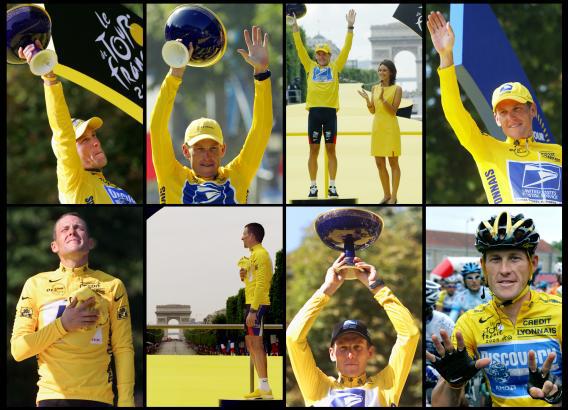Also in Slate, Josh Levin explains why Lance Armstrong stopped fighting the doping charges.
“Seven-time Tour de France winner Lance Armstrong” will soon just be Lance Armstrong. The most celebrated cyclist on the planet has decided to end his fight against doping charges, claiming that the U.S. Anti-Doping Agency’s legal process was an “unconstitutional witch hunt” after losing his most recent legal challenge.
The agency has banned Armstrong from all competition for life and is now recommending that the International Cycling Union strip the Texan of his record number of maillots jaunes, an outcome that now seems more likely than not.
One of the biggest questions for cycling fans now becomes what happens to Lance’s titles? Having covered professional cycling for the three years after Armstrong’s retirement, I can tell you that the sport was at the time marred more by major doping scandals involving Lance’s successors than it was by the shadows hanging over Armstrong’s own career.
Every single rider that finished second to Lance has since been connected to doping, and the majority of them have either been directly convicted in ways comparable to Armstrong or confessed to their own crimes.
Consider the “doping palmarès” of the seven runners-up of Lance’s seven Tour wins:
TDF 1999, Alex Zülle (Switzerland): Zülle was banned from the previous year’s Tour for taking the blood-boosting drug EPO during the infamous Festina Affair. He even admitted to cheating, but one year later he was on the podium behind Armstrong.
TDF 2000, Jan Ullrich (Germany): Lance’s greatest rival won the 1997 Tour two years before Lance claimed his first title, but finished second-place four times after that. In 2006, Ullrich was implicated in the Operación Puerto blood-doping scandal in which dozens of cyclists were named after Spanish police raided the offices of sports doctor Eufemiano Fuentes and discovered one hundred packets of blood and about a thousand doses of steroids. Ullrich was suspended from racing in the 2006 Tour de France, and eventually given a two-year suspension. He also had his third-place finish at Lance’s final Tour in 2005 annulled.
TDF 2001, Jan Ullrich (Germany): See above.
TDF 2002, Joseba Beloki (Spain): Possibly the Lance runner-up with the cleanest record, Beloki was implicated in the Operación Puerto doping scandal in 2006, but was later cleared by a Spanish court along with four teammates including future two-time Tour winner Alberto Contador, who was later suspended for doping. Beloki retired after the Puerto scandal and never raced professionally again.
TDF 2003, Jan Ullrich (Germany): See above.
TDF 2004, Andreas Klöden (Germany): Like Beloki, Klöden was never formally convicted of any doping charges. But an independent commission found that during the 2006 Tour de France, in which he also finished second, Klöden received a blood transfusion from the Freiburg University Clinic.
TDF 2005, Ivan Basso (Italy): Like Ullrich, Basso was implicated in the Operación Puerto scandal and suspended from the 2006 Tour de France, for which he was the heavy favorite to win. He later admitted to “attempted doping” to the Italian National Olympic Committee and was suspended from racing for two years.
The point of this list is by no means to exonerate Armstrong. I think those in the media who have been reluctant to condemn him in the past, always qualifying his misdeeds with the words “alleged,” can now do so in the harshest terms. He has been found guilty of doping by a legitimate sporting body and instead of contesting the charges he has decided to challenge the body’s legitimacy in the court of public opinion. What Armstrong is doing is comparable to a mob boss refusing to enter a guilty or innocent plea after all of his lieutenants became state witnesses, instead choosing to decry the U.S. Justice Department as an illegal entity.
My only point in bringing up this list is to show that during the decade that Armstrong raced, and for many of the proceeding years, doping was endemic. If you strip Armstrong of his titles then you should also declare all seven years null and void. There should be no Tour de France winner on the record books from 1999 to 2005. Those years should be vacated.
No one man is to blame for this fact. But Armstrong is as guilty as any.
Update: The USADA has now said it is stripping Armstrong of his seven Tour titles. The International Cycling Union had been fighting with the USADA over jurisdiction in the case.
